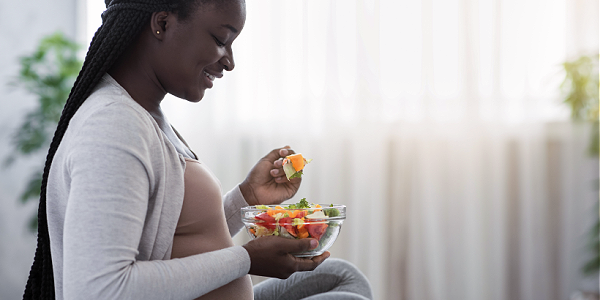
Up to this point, holding a healthy weight came naturally. But recently, those pair of jeans feel a little snugger despite carrying out those daily habits implemented for years.
Approaching middle age brings new transformations the body, which makes weight much easier to gain compared to younger years.
While aging is inevitable, making modifications to your current lifestyle can help you beat middle-age weight gain.
The Best Diet for Middle-Aged for Men and Women
The best weight loss plan for middle-aged for women and men involves the following diet recommendations:
Increase Fruits and Veggies
A study published in the International Journal of Obesity suggests increasing intake of fruits and vegetables may reduce long-term risk of obesity and weight gain among middle-aged women. Though participants tended to gain weight with aging, those with the largest increase in fruit and vegetable intake had a 24 percent of lower risk of becoming obese.
Both women and men can benefit from increasing fruits and veggies, especially as the Centers for Disease Control and Prevention reports only one in 10 adults eat the recommended intake of produce.
Experiment with various veggies and healthy methods to prepare them, including baking, roasting, and broiling. You can also throw (and sneak) vegetables into smoothies, soups, pastas, casseroles, and other dishes to increase their intake and obtain their valuable nutrients.
Swap Refined Grains with Whole Grains
Compared to refined grains, whole grains are richer in fiber and other nutrients. Fiber is an indigestible plant compound that cannot be absorbed or digested within the body.
High-fiber foods tend to be naturally low in calories and more filling than foods lacking fiber. The combination of low-calorie and satiety may facilitate weight loss and/or encourage weight maintenance.
After examining the meal patterns of approximately 74,000 female nurses aged 38 to 63 over a 12-year span, researchers found women who consumed more whole grains consistently weighed less than did women who consumed less whole grains. In fact, women in the highest quintile of dietary fiber intake had a 49 percent lower risk of major weight gain!
Ideally, whole grains should comprise at least 50 percent of total grain consumption. Choosing whole wheat breads and pastas over refined products and consuming more oats, brown rice, and other whole grains can ensure adequate intake.
Limit Sugar Intake
Whereas fat was victimized in the past, ongoing evidence points sugar is one of the largest dietary culprits of weight gain in all ages. What’s more, sugar and the products it comprises essentially offers nothing more than extra calories, thus placing greater risk of weight gain.
While not so surprising, a JAMA study examining the intake of sugar-sweetened beverages on weight gain and diabetes in young and middle-aged women found a higher consumption of the sugary drinks associated with a greater magnitude of weight gain and an increased risk for development of type 2 diabetes in women, possibly by providing excessive calories and large amounts of rapidly absorbable sugars.
The American Heart Association (AHA) recommends men and women limit sugar consumption to 38 and 25 grams of sugar per day, respectively. But in addition to eating less sugar in the forms of cookies, cakes, donuts, and other sweet treats, watch out for hidden sugar in dressings, yogurts, and sauces and take advantage of Nutrition Facts and Ingredients labels.
Likewise stay cautious of “natural” or “healthy” sugars, including honey and agave, as all forms of sugar can add on calories and cause weight gain.
Ensure Adequate Protein
The current Recommended Daily Allowance of protein is 0.8 grams of kilogram of body weight per day (g/kg/day), or at least 46 grams daily for women and 56 grams for men.
But there is growing evidence suggesting advancing age demands more protein to combat against age-related muscle loss, that often comes starts around age 50. A 2015 review in Nutrients reports there is good consistent evidence that consumption of 1.0 to 1.3 g/kg/day dietary protein, particularly combined with twice-weekly progressive resistance exercise reduces age-related muscle mass loss.
But just 33 percent of women and 50 percent of men reported meeting the RDA for protein in a 2016 study, though women and men consuming at least 0.8 g/kg/day had a 6.2 percent and a 3.2 percent higher percent fat free mass, respectively.
Fortunately, protein is abundant in the food supply. Incorporate more leans meats and fish (sirloin, chicken, eggs, shrimp, tuna), milk and dairy products (Greek yogurt and cottage cheese), and plant-based proteins (beans, lentils, quinoa, soybeans) to ensure meeting these recommendations, along with reducing the intake of processed meats.
Additional tips to ensure adequate high-quality proteins include:
• Starting the day with a high-protein breakfast
• Including a protein source with all meals
• Integrating a fiber and protein-rich snack
• Switching from traditional yogurt to protein-packed Greek yogurt
• Incorporating more plant-based proteins into a balanced eating plan
Moderate Alcohol Consumption
Heavy alcohol intake contributes directly to weight gain and obesity, irrespective of the type of alcohol consumed, suggests data in The American Journal of Clinical Nutrition.
If you are to drink, men are advised to no more than two servings of alcohol per day while limited to one. Furthermore, consult with your doctor if managing a health condition and taking medications to ensure the safest drinking practices.
Best Weight Loss Plan for Middle-Aged Men and Women: Extra Tips
In addition to creating the best diet for middle-aged for women and men, there are extra lifestyle tips to help beat weight gain.
Exercise Regularly
Whether working a desk-bound job or watching too much television, sedentary behaviors can lead to weight gain, chronic diseases, and premature death. That being said, the importance of exercise cannot be stressed enough at any age to manage weight and improve overall health.
Aerobic exercises support weight loss by burning calories, especially when paired with a balanced diet. Cardio exercises include brisk walking, jogging and running, cycling, dancing, rowing, cardio kickboxing, jumping jacks, skiing, and any other continuous movements that elevate heart rate.
Some common household tasks can also count as aerobic exercise, including raking the lawn, washing the car by hand, and cutting the grass with a push lawnmower. Complementing with strength training further bares sustainable, long-term weight loss and preserves lean muscle mass.
The AHA recommends 150 minutes of cardio weekly, though those minutes can be dispersed at your discretion. Likewise incorporate at least two to three strength training sessions into your workout regimen and focus on working the major muscle groups, including the chest, back, shoulders, arms, and legs.
Get Enough Sleep
Going without places great risk of weight gain by deregulating hunger hormones, compensating low energy with sugary foods. Negative emotions caused by insufficient sleep may also intensify cravings towards comfort foods.
To mitigate the risks of inadequate sleep on weight gain, the National Sleep Foundation recommends between seven to nine hours of sleep each night. If struggling missing the mark on sleep recommendations, build a healthy bedtime routine with the following tips:
• Confine caffeine to the morning and early afternoon hours
• Avoid eating large meals before bed, as laying down on a full stomach places risk of indigestion and heartburn
• Stay consistent with bedtime and wake hours
• Power down from electronics leading up to bedtime
• Write out thoughts and worries that tend keep you up at night
• Prepare a comfortable sleep environment, considering the temperature of the room and support of your mattress and pillows
• Take bath to warm up the body and induce appropriate sleep cycles
• Practice relaxation techniques, such as breathing exercises and guided imagery
Manage Stress
Stress is something that many of us have to deal with every day, but it can also put a halt on your weight loss goals. When bills start piling up, when life gets complicated, we either eat a lot less, or eat even more.
Stress is not ideal for weight loss because it makes our bodies crave things, like sugars and starches, especially if we are not eating a proper diet.
Exercising, hiking, and listening to music, and practicing other preferred stress.








